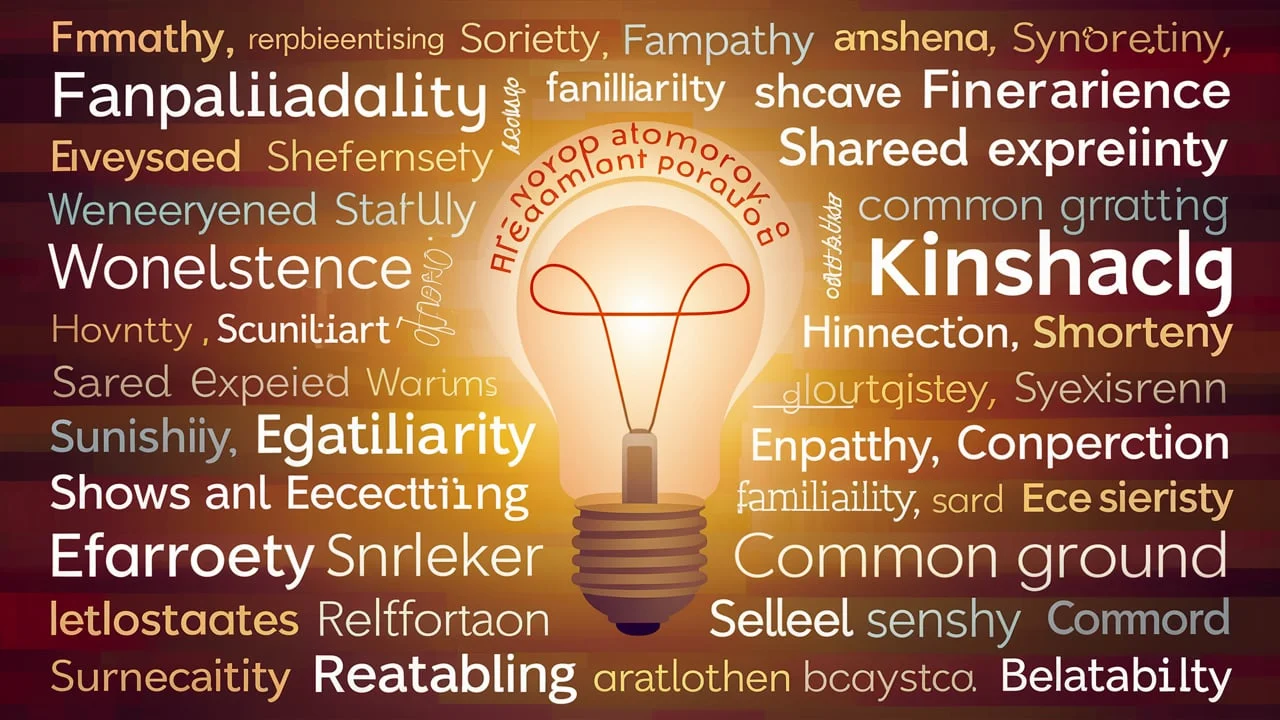Best Synonyms for Relatability “ Relatability is a powerful word that describes how easily people connect with something or someone. It is what makes a story, a person, or an idea feel familiar and understandable. When something is relatable, it feels like it belongs to our world, making it easier to engage with and appreciate.
Imagine you are watching a movie, and the main character faces the same struggles as you. You immediately feel a connection. That’s relatability! It makes conversations more meaningful, friendships stronger, and even stories more enjoyable.
But what if you want to use different words instead of “relatability”? There are many synonyms that express the same idea but in unique ways. In this article, we will explore 15 of the best synonyms for relatability. Each word will be explained in a simple way, so you and your friends can understand them easily.
So, let’s dive into these words and see how they can bring more depth to your conversations!
Connection
Connection is one of the best synonyms for relatability. When you relate to someone or something, you feel a strong connection. It’s like an invisible bridge that links two people together through shared experiences, thoughts, or emotions. Best Synonyms for Relatability “
For example, when you meet someone who enjoys the same hobbies as you, such as playing video games or painting, you immediately feel a connection. This bond makes conversations easy and enjoyable.
Connection is important in friendships, families, and even in storytelling. A good book or movie creates a strong connection with its audience by making the characters and situations feel real. When people feel connected, they care more and listen better.
So, the next time you want to say that something is relatable, you can use the word “connection” to show how deeply it resonates with people.
Read more: Other Ways to Say “Talk to You Then”
Understanding
Understanding means that you “get” something or someone. It’s a perfect synonym for relatability because when something is relatable, it’s easy to understand.
For example, if your friend is feeling sad, and you have been in the same situation before, you understand their feelings. That’s why they feel comfortable sharing their emotions with you.
Understanding is the key to good communication. If a teacher explains a lesson in a relatable way, students understand it better. The same thing happens in books and movies—when the characters act in a way we understand, we enjoy the story more.
Using the word “understanding” instead of “relatability” makes your conversation more engaging and thoughtful. It shows that you truly care about others and their feelings.
Similarity
Similarity means that two things are alike in some way. It is a great synonym for relatability because when you relate to something, it often means that it is similar to your own experiences.
For example, if you and your best friend both love watching superhero movies, you share a similarity. This makes your friendship stronger because you both enjoy the same things.
In stories, similarity helps people feel connected to the characters. If a character in a book has a life similar to yours, you will find the story more interesting.
When you use the word “similarity” instead of “relatability,” you show that two things have something in common. It’s a simple but powerful way to express how people and ideas connect.
Familiarity
Familiarity means knowing something well or feeling comfortable with it. It’s a great way to describe relatability because when something is relatable, it feels familiar.
Think about your favorite song. The more you listen to it, the more familiar it becomes. That’s why you love it—it feels like home. The same happens with people. When you meet someone who shares your culture or background, there’s a sense of familiarity that makes you feel connected.
Familiarity is important in communication too. If a speaker uses examples from everyday life, people understand the message better. That’s because familiar things are easier to relate to.
By using the word “familiarity” instead of “relatability,” you can describe how comfortable and connected something feels.
Empathy
Empathy means understanding and sharing the feelings of others. It’s a great synonym for relatability because when something is relatable, it often touches our emotions.
For example, if your friend is nervous before a big test, and you have felt the same way before, you can show empathy. You understand their feelings because you’ve been there too.
In movies and books, empathy makes characters more relatable. When we see a character struggling, and we feel their pain, we become emotionally attached to their story.
Using “empathy” instead of “relatability” shows that you not only connect with something but also feel deeply about it.
Resonance
Resonance means something deeply affects or connects with you. It is a strong synonym for relatability because when something resonates with you, it feels personal and meaningful.
Imagine listening to a song that perfectly describes your feelings. That song resonates with you because it reflects your emotions and experiences.
Resonance is also common in storytelling. A powerful speech or an inspiring movie stays with us because it resonates with our thoughts and dreams.
By using “resonance,” you can describe how something connects with people on a deeper level.
Similarity
When something is similar to your own experiences, it becomes more relatable.
For example, if you watch a movie where the main character is struggling with school, you might find it similar to your own life. This makes you feel a stronger connection to the story.
Using “similarity” instead of “relatability” helps explain how two things share common ground.
Comprehension
Comprehension means understanding something clearly. It’s a great synonym for relatability because when something is relatable, it is easy to understand.
If a teacher explains math in a way that makes sense to you, it improves your comprehension.
Using “comprehension” instead of “relatability” highlights how well something is understood.
Closeness
Closeness means feeling near to someone or something. When you relate to someone, you feel close to them emotionally.
If you and your friend both love the same kind of food, that closeness makes your friendship stronger.
Using “closeness” instead of “relatability” shows how people or ideas bring us together.
Realness
Realness means being true and authentic. People relate to things that feel real and honest.
If a story feels real, people connect with it more.
Using “realness” instead of “relatability” expresses how something feels genuine and true.
Belonging
Belonging means feeling like you are part of something. When something is relatable, it makes you feel like you belong.
For example, being part of a group that shares your interests gives you a sense of belonging.
Using “belonging” instead of “relatability” expresses how something makes you feel included.
Identifiability
Identifiability means being able to recognize yourself in something. When a story reflects your life, it becomes identifiable.
Using “identifiability” instead of “relatability” highlights how easily something reflects your own experiences.
Association
Association means connecting one thing to another. When something is relatable, you associate it with your own life.
If a smell reminds you of your childhood, that’s an association.
Using “association” instead of “relatability” shows how things connect in our minds.
Engagement
Engagement means being involved or interested in something.
If a book is relatable, it keeps the reader engaged because it feels personal.
Using “engagement” instead of “relatability” highlights how something keeps people interested.
Affection
Affection means having warm feelings or a sense of care toward something or someone. It is a great synonym for relatability because when we relate to something, we often feel emotionally connected to it.
For example, when you watch a movie about a loving family, you might feel affection toward the characters because they remind you of your own family. This emotional bond makes the story more meaningful and enjoyable.
Affection also plays a big role in friendships and relationships. When you find someone relatable, you naturally feel closer to them and develop a sense of affection. This is what makes strong friendships last.
Using “affection” instead of “relatability” shows how much something touches your heart and makes you feel connected to it. Whether it’s a story, a person, or an idea, affection adds warmth and depth to the connection you feel.
Conclusion
Relatability is all about making connections, understanding, and feeling close to something. Whether through familiarity, empathy, or engagement, it helps people feel less alone in their experiences.
By using these 15 synonyms, you can express relatability in different ways. Whether you’re talking about a story, a friendship, or an idea, choosing the right word can make your message more powerful.
Now that you know these words, try using them in conversations, writing, or storytelling. They will help you express ideas more clearly and connect with others on a deeper level!

James Carter is a language expert at WordSeekerz.com, dedicated to making English grammar and vocabulary simple and engaging. Explore more at WordSeekerz.com and enhance your language journey today!










